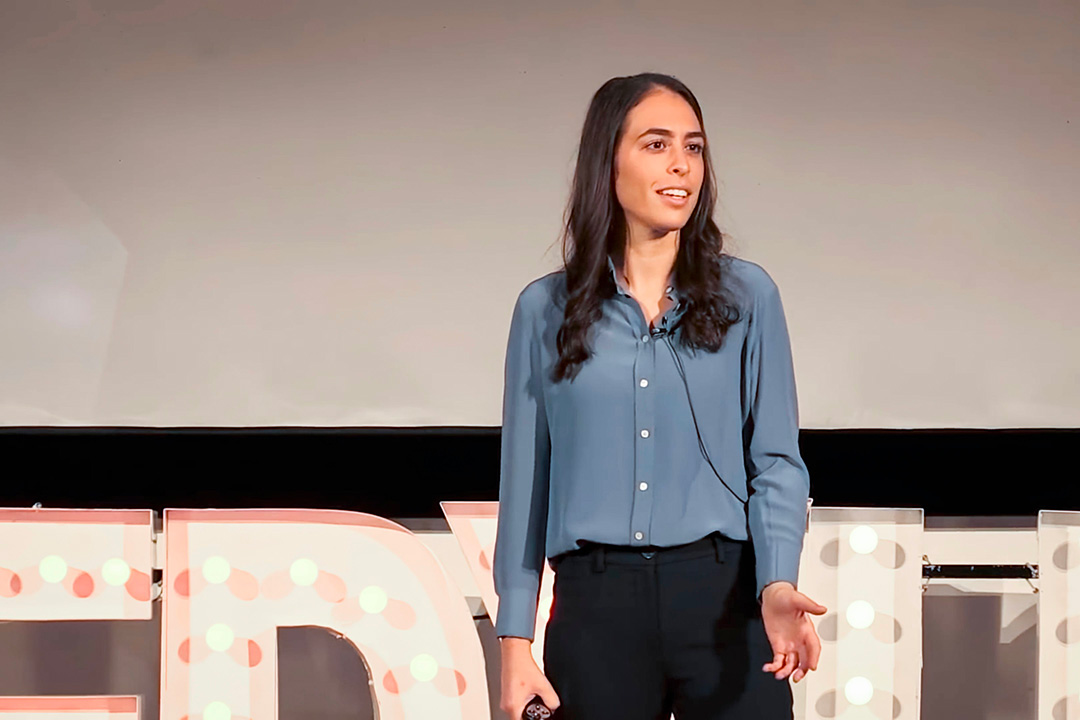For many people, social interactions can be a source of dread. While some of us revel in parties, meetings and lunches, others are planning their exit strategy before they even step into a room.
And for the 40 million Americans who suffer from social anxiety disorder, notes Assistant Professor of Psychology Fallon Goodman, gatherings from crowded dinners to one-on-one coffee dates aren’t just uncomfortable—they can feel like white knuckle terrors.
More than 12 percent of Americans will have diagnosable social anxiety disorder at some point in their lives, according to Goodman, who studies the condition in her Emotion and Resilience Lab at the Columbian College of Arts and Sciences (CCAS). That number includes high-profile figures like tennis champion Naomi Osaka and Academy Award-winner Viola Davis.
Although they are often dismissed as introverts or simply shy, Goodman emphasized their condition isn’t harmless or fleeting. While every case of social anxiety looks different, it’s linked to elevated risks of alcohol and drug abuse as well as other mental illnesses like depression. Perhaps most alarming, Goodman maintained, is that social anxiety causes people to hide from interactions, robbing them of what she calls their greatest resource: other people.
“Humans are hard-wired to connect with each other,” she said. “But social anxiety gets in the way of people living the lives they want to live.”
Rejection Response
At its core, Goodman said, social anxiety is tied to the fear of rejection. While rejection rears its head in every life—whether it’s being ghosted after a first date or being passed over for a dream job—people with social anxiety disorder intertwine that rejection with their views of themselves. “You believe you were ghosted because you’re not lovable enough,” Goodman explained. “You believe you were turned down for that job because you’re not intelligent enough.” And each nerve-wracking encounter makes it harder for them to risk rejection again. “For some people, rejection is so painful, so traumatic, that they systematically avoid social interactions throughout their life,” she said.
Fallon, who came to CCAS in 2022, has long worked with young people experiencing social anxiety, such as children who shied away from playing with their peers and teenagers who resisted eye contact. “It’s frustrating to see a six-year-old already intentionally avoiding one of the best parts about being human—connecting with other people,” she said.
Goodman herself had never experienced social anxiety “in all its terrible glory,” she said, until she boarded an impulse flight to Australia during her PhD program. Isolated in a Melbourne hostel, she realized that, like people with social anxiety, she was searching for clues to social norms. She scanned every encounter for nods of approvals or scowls of rejection, hyper-focused on how her clothes and speech differed from others around her. “In every social comparison, I missed the mark,” she said. She fought the urge to retreat to her room rather than approach fellow travelers. “I learned a lesson about social anxiety,” she said. “It feels paralyzing.”
In her CCAS lab, Fallon and her team of five graduate student researchers examine how people overcome social anxiety, build lasting social relationships and foster resilience to adversity. Much of her research uses smartphones to capture emotions as they unfold in real time and identify the daily situations that worsen social anxiety. Her work has been featured in national media outlets including CNN, The Washington Post and Harvard Business Review, and her 2021 TED Talk on social anxiety has been viewed more than 1 million times.
And while social anxiety disorder is one of the most common mental illnesses in the world—and a fairly easy one to detect with just a few diagnostic questions, Goodman said—it’s often misdiagnosed and misunderstood.
Goodman frequently dispels common myths about the condition, like the belief that people with social anxiety disorder actually like being alone. “They don’t prefer hiding alone in their homes. They desire strong connections as much as anyone else,” she said. In fact, participants in her lab often say that, despite their fear of rejection, their spirits are buoyed when they socialize. “It speaks to the power of social relationships and social connection,” she said, “when doing the thing they presumably fear most actually makes them feel better.” Goodman often recommends engaging in what she calls “social courage.” She encourages people to intentionally jump into situations that they would otherwise be too anxious to enjoy. “Most of the time they find their biggest fears don’t come true,” she said.
Still, she cautions against minimizing the experiences of groups that are disproportionately subjected to rejection, including the LGBTQ+ community. One of her lab’s projects, led by clinical psychology PhD candidate Paddy Loftus, is examining how discrimination risk perceptions influence LGBTQ+ people’s daily activities. “We want to foster social courage and give people the tools to handle rejection when it comes,” she said. “But we also need to appreciate that not everyone is equally experiencing rejection in our world.”
Meanwhile, Goodman is encouraged by people who harness their platforms to help reduce stigma and correct harmful myths—whether it’s Osaka’s international celebrity or candid conversations in communities, schools and workplaces. “We’ve got a long way to go in understanding what social anxiety is and not equating it to some sort of weakness,” she said. “But in this hyperconnected world, a single person can have a ton of power. They can use their platforms to create meaningful and lasting change.”


